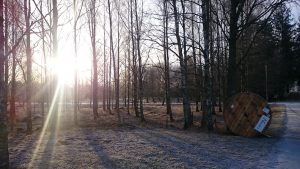Around three months ago, we published a call for papers for the “Science, technology and society” working group that the STS Helsinki group organized at the Annual Conference of the Westermarck Society, more commonly known as Sosiologipäivät (Sociology Days in Finnish). We were happy to receive quite many abstracts, which resulted in two very fruitful and intense sessions with a total of 17 presentations taking place during the 23rd and 24th of March at the University of Tampere.
We divided our working group into five smaller thematic sessions.
Session 1: ANT and technology
Elina Paju, Minna Ruckenstein and Päivi Berg explored in their paper children’s physical activity as an issue of neoliberal government through the products of ReimaGo activity sensor for kids and the Pokemon GO game. Mervi Jalonen focused on the notion of experiment in an innovation-based society, discussing various examples of experiments aimed to facilitate sustainability transitions. Meanwhile Oskari Lappalainen presented ongoing work on the development of personal data economy through the social movement called MyData.
Session 2: Fertility and reproduction
Elina Helosvuori discussed her ethnographic study on infertility, deploying the notion of excess to grasp the personal experiences generated through IVF. Riikka Homanen turned the focus on transnational egg donation where enacting Nordicness, whiteness and kinness is at play. Lise Eriksson presented a paper on surrogacy and uterus transplantation from the point of view of medical knowledge production.
Session 3: Social research, impact and policy
Reetta Muhonen presented a project tracking research in social sciences and humanities with a practical side by following projects from different sites in Europe. Kamilla Karhunmaa talked about energy policy and different expectations in the field in the Finnish context. Juha-Pekka Lauronen discussed how social research’s impact in society is understood among policymakers, researchers and science administrators. Johanna Hokka introduced research on orthodox definitions of sociology among Finnish and Swedish professors.
Session 4: Knowledge production
Salla Sariola’s presentation discussed the governance of international clinical trials in India, showing how civil society activists managed to negotiate changes in the regulations guiding them. Minna Ruckenstein analysed breakages and gaps in data and the practices of repair involved in using such data for research. Annika Lonkila’s theme was the use and non-use of genomic knowledge on dairy farms, specifically the practices involved in the selection of animals for breeding. Anuradha Nayak presented the case of cryo-preserved life and the legal problems regarding the status and ownership of the preserved ‘material’.
Session 5: Genes and molecular life
Mianna Meskus, explored craftsmanship as a way to describe the use of cutting-edge biotechnology in the field of stem cell research. Secondly, Heta Tarkkala introduced her work on the Finnish biobanking scene, in which genetic uniqueness and difference appear as sources of value for the use of Finnish samples in international biological research. Finally, our last presentation had Venla Oikkonen present some ideas related to how genomes and DNA relate to temporality, belonging and nostalgia.
Finally, we were happy to see that so many scholars with such varied topics, but still many common interests, came together and shared ideas. Hopefully, this was only the first of many other encounters to come in which the STS community in Finland starts to take shape. We would like to especially thank all the presenters for their work and willingness to participate. See you all next year!

